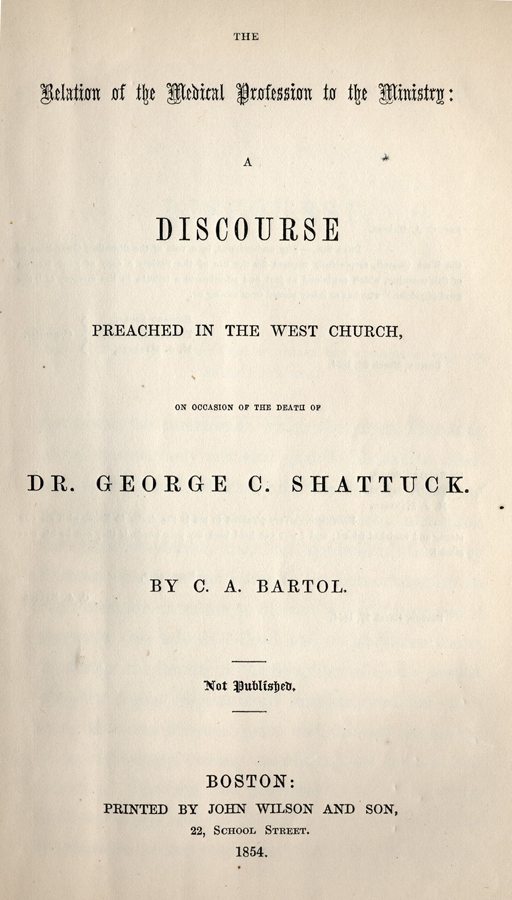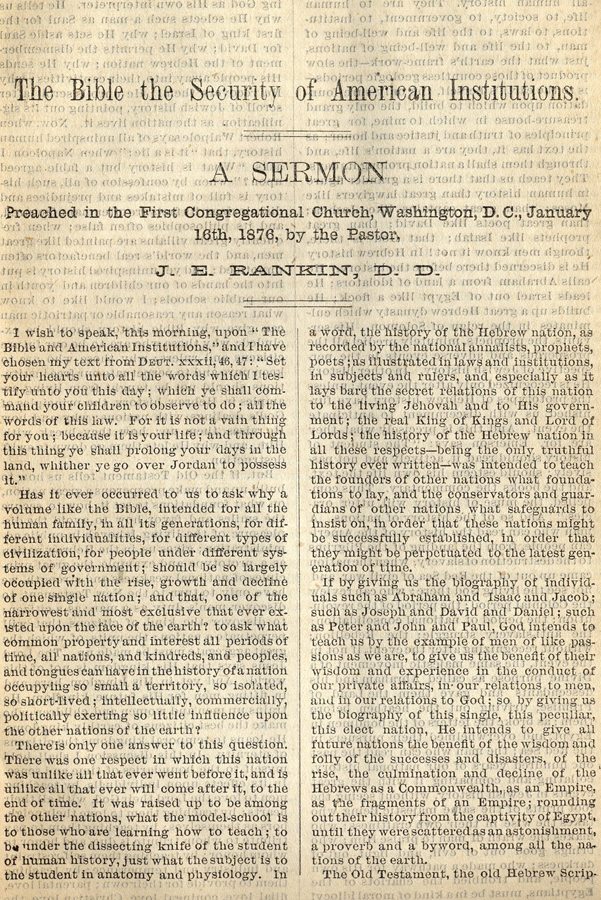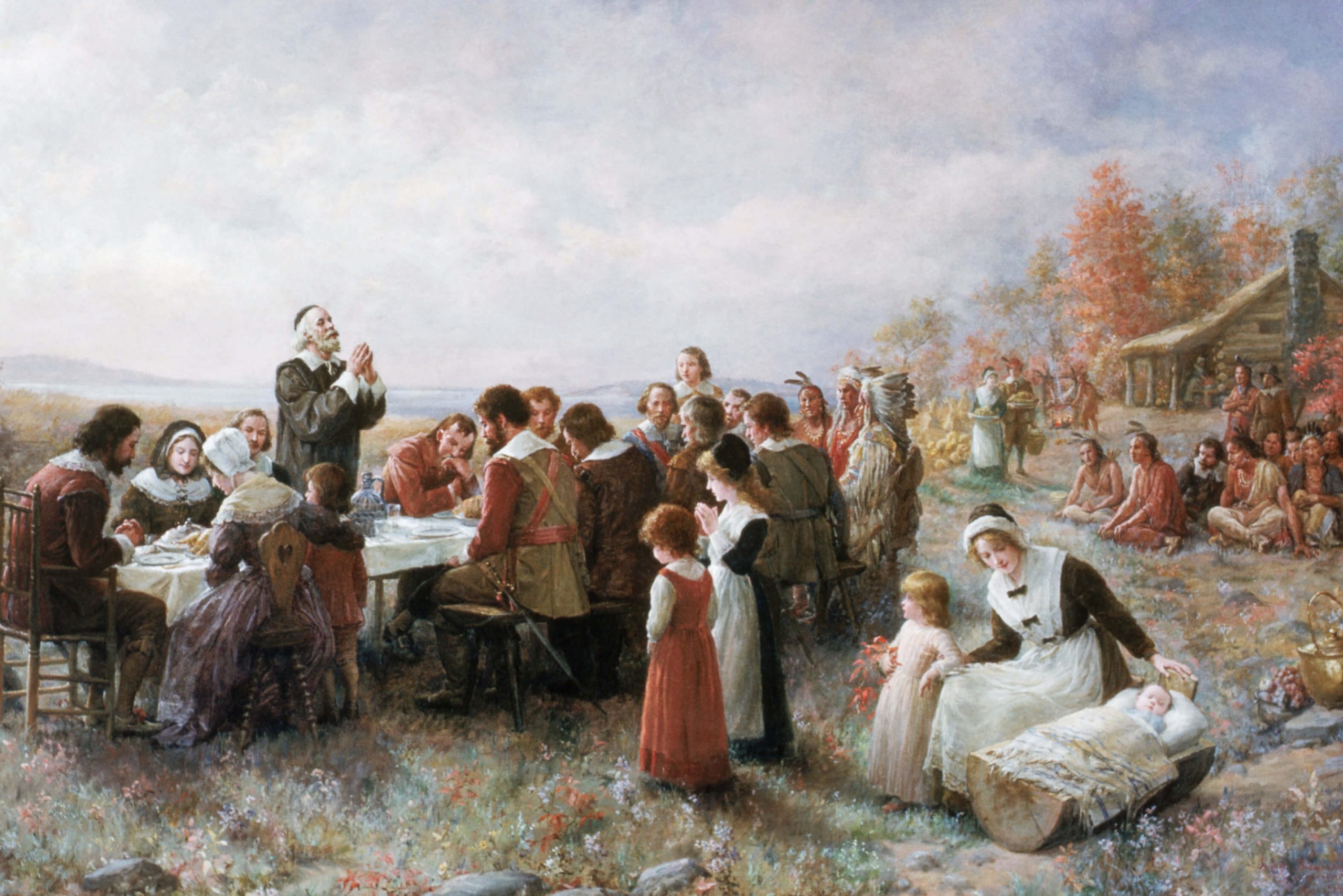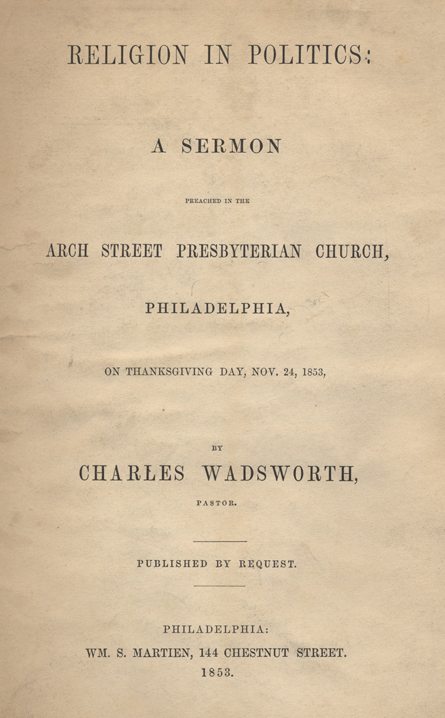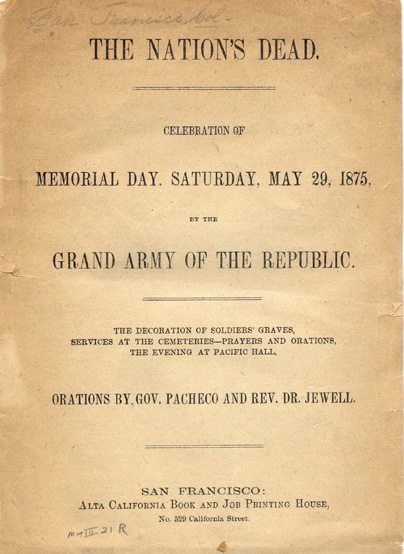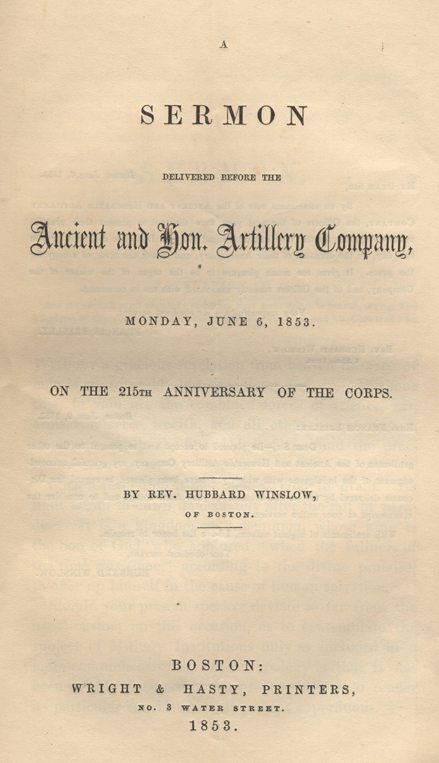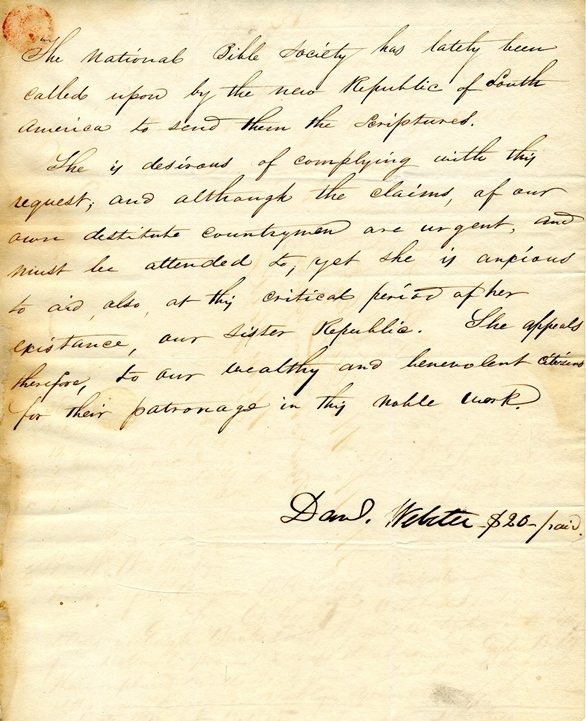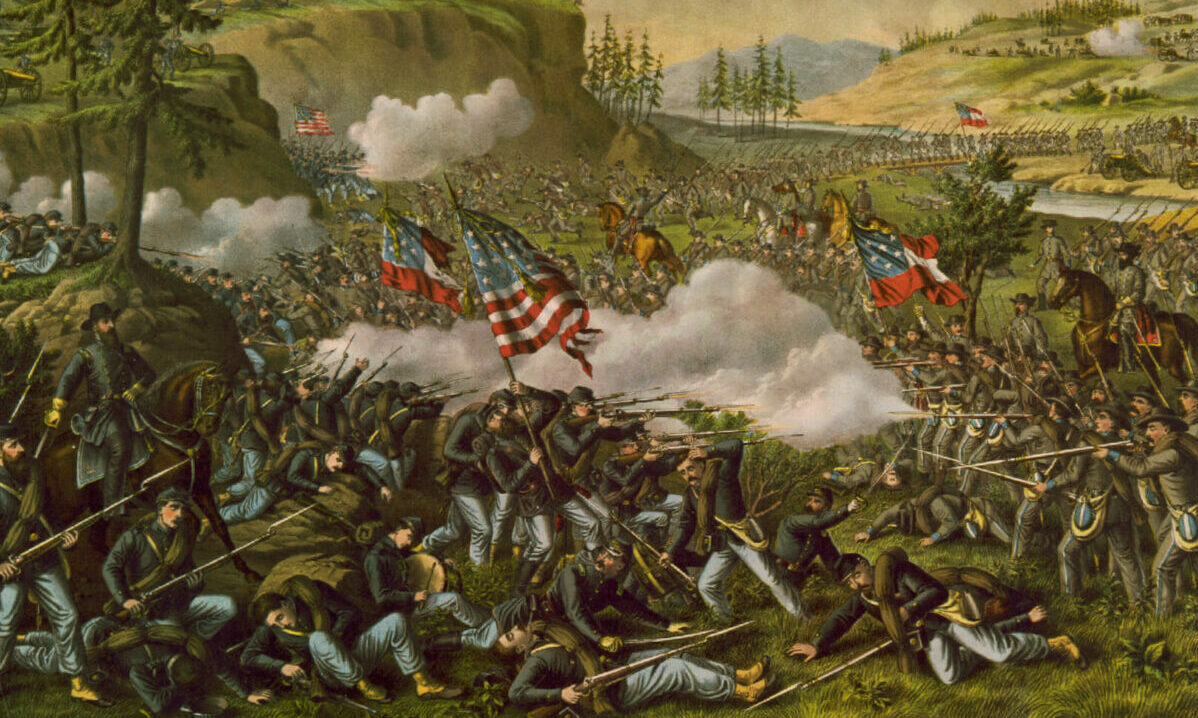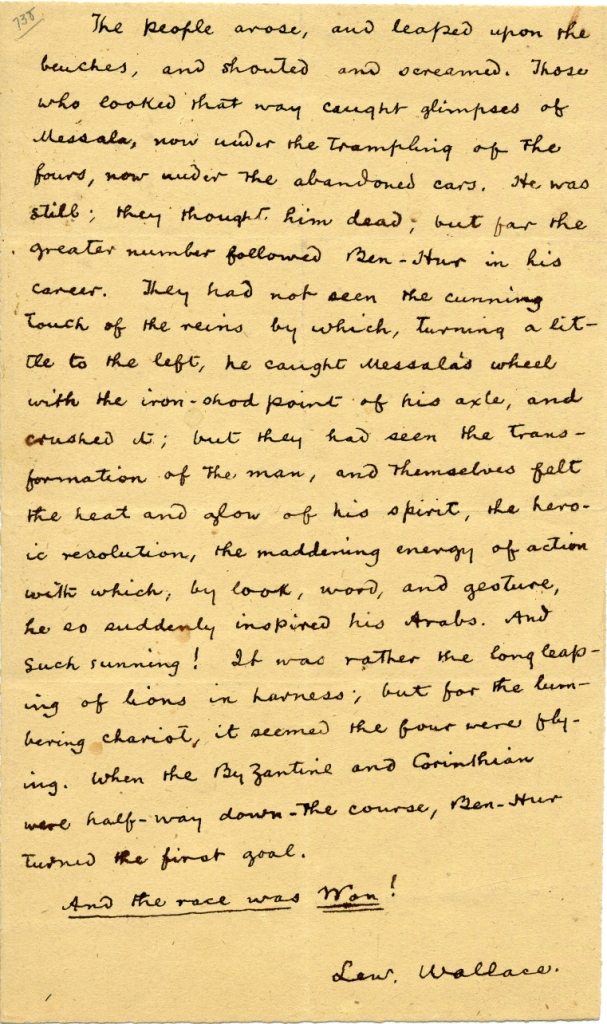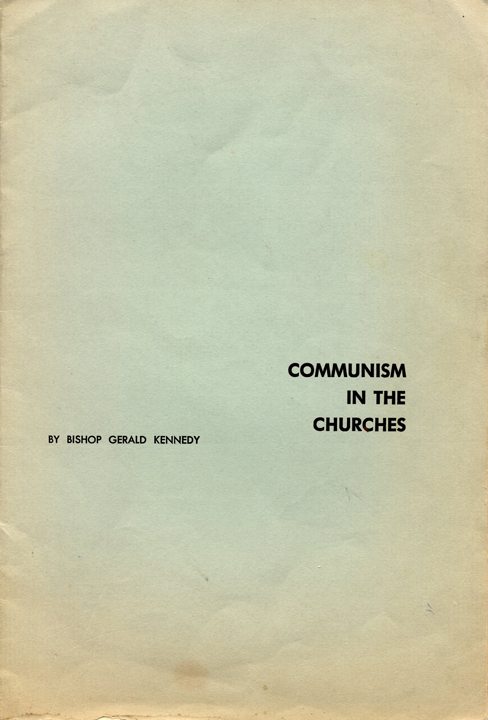Luther Alexander Gotwald (1833-1900) gradated from Pennsylvania College in 1857 and the theological seminary there in 1859. He was preacher in many towns including: Shippensburg, Chambersburg, Labanon and York, PA and Dayton and Springfield, OH. The following sermon was preached by Gotwald in 1877 in York, PA.
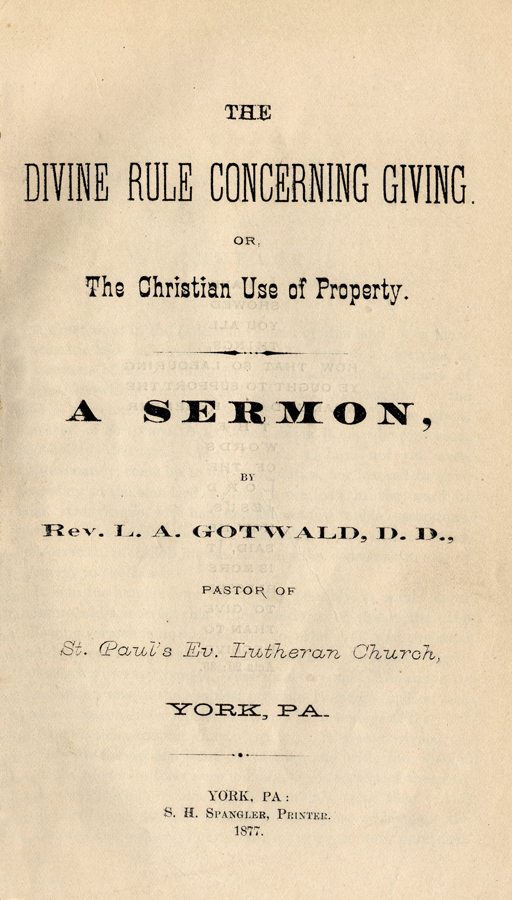
DIVINE RULE CONCERNING GIVING.
OR,
THE CHRISTIAN USE OF PROPERTY.
A SERMON,
BY
Rev. L. A. GOTWALD, D. D.,
PASTOR OF
St. Paul’s Ev. Lutheran Church,
YORK, PA.
I HAVE SHOWED YOU ALL THINGS, HOW THAT SO LABOURING YE OUGHT TO SUPPORT THE WEAK AND TO REMEMBER THE WORDS OF THE LORD JESUS, HOW HE SAID, IT IS MORE BLESSED TO GIVE THAN TO RECEIVE.
Acts 20:35.
It is in the humble hope that it may possibly, in some slight measure, aid to correct this wrong condition of things, that the following sermon is now committed to print. It was prepared and delivered by appointment before the YORK AND ADAMS COUNTY CONFERENCE OF THE SYNOD OF WEST PENNSYLVANIA. The aim in its composition was, in the simplest possible language and in the smallest reasonable compass, to exhibit the teachings of the word of God on this Christian duty of giving. It was designed especially for the ear and heart of the laity, and with the wish, if possible, to stir up their pure minds to a realization of the great things which God, in this respect, requires from them. And with this design, and with this purpose of thus addressing the noble men and women of our churches, it is also now published.
The sermon is not “published by request,” neither of congregation nor conference nor synod. The only one who has requested its publication is the author himself. And this his own request he complies with from no other motive than the desire to help forward all he can the various benevolent activities of the church to which he belongs and which he loves as he loves his own life.
Being published and distributed gratuitously he asks only the small favor that each one to whom it may be sent will carefully read it, with a mind open to conviction, and with a heart willing promptly to comply with whatever is established from the word of God as Christian duty; for, in the language of our own precious Luther, “God has given to us the measuring line of His own word, and they that lie and do thereafter, well it is for them, for God will richly reward them both in this life and in the life to come.”
York, PA., August 23d, 1877.
UPON THE FIRST DAY OF THE WEEK LET EVERY ONE OF YOU LAY BY HIM IN STORE, AS GOD HATH PROSPERED HIM, THAT THERE BE NO GATHERING WHEN I COME.” 1ST Cor. 16: 1-2.
This text is an expression of the Scriptural Rule of Beneficence.
Concerning this rule it may, in a preliminary way, be remarked that it is given, not as mere advice, which we are at liberty either to heed or to disregard, but that it comes to us clothed with divine authority and in the form of an emphatic and positive divine command. Paul wrote this epistle, as he wrote all his other epistles, under the direct inspiration of the Holy Ghost.—His words, therefore, are God’s words. And hence, when, in enunciating this Rule, he here says:—“I have given order or command to the churches to lay aside systematic contributions for religious or charitable purposes,” we must receive what he says as the command or order to us of God Himself, a divine law which possesses the same binding force and obligation which is possessed by any other divine law.
It may also, as a preliminary thought, be further observed, that this Scriptural Rule of Beneficence, as here stated by the Apostle, is universal in its application, or, in other words, is binding upon all Christians, and upon one church as much as it is upon another. For this epistle, it may be noticed, is addressed not alone to the Corinthian Christians, but “to all that in every place call upon the name of Jesus Christ our Lord both theirs and ours.” Besides, the Apostle here expressly says that this same rule which he thus gives to the Corinthian church, he had also given “to the churches of Galatia.” And, in addition to all this, it might be well asked, if this rule or law is not perpetual and binding upon the present Christian churches, as much as upon those to whom the Apostle spoke and wrote, then what scriptural rule or law is thus perpetual or binding? If this rule is local and temporal, in its application, then what rule, in the whole canon of the word of God, is not? This rule of Christian beneficence, here addressed to the Corinthian Christians, we must, therefore, regard as being, also, directly and personally addressed to each one of us, and in these words we must hear not the Apostle only, but God Himself saying to us all, “at certain stated times, let every one of you lay by him in store, as God hath prospered him:”
But let us now turn to an analysis and careful consideration of the Rule itself. In looking at it, I notice—
I. That it involves the element of Intelligence, or a knowledge of the specific objects claiming Christian Beneficence. The object toward which these Corinthian Christians were here asked to give was the relief of the poor saints at Jerusalem. This object the Apostle had fully explained to them; had shown them the need of these their suffering fellow Christians; had exhibited to them their obligations toward them; and had given to them such a clear and intelligent statement of the case that they fully understood all concerning it.—(2 Cor. 8: 10; 9: 2, 5.).
They were not only asked to give, but to give intelligently, and they were first thus made intelligent with regard to the object in order that they might and would cheerfully and liberally give.
This scriptural rule of beneficence, embraces, then, as a first element, intelligence. Christians, in giving to religious objects, should know what those objects are. They should be informed with regard to their precise character, their aims, their history, the extent of their operations, their success, their hindrances, their possibilities, their merits, their claims. And hence every Christian should, in every possible way, seek to make himself intelligent with regard to all church work. To this end he should study the doctrines and polity of his church. He should be familiar with her history. He should acquaint himself with all her institutions and organizations for the prosecution of the cause of Christ. He should be a student of her literature. He should, week after week, through her various journals, inform himself of what the church, both at home and in heathen lands, is seeking to do for the world’s conversion. He should also carefully read the proceedings of her Synods, and especially of her General Synod, and thus learn what the combined wisdom of the church adopts and recommends as the best methods of doing good. And to this end, also, there rests a most emphatic duty upon every minister of the church. The priests lips should keep knowledge and the people should seek the law at his mouth, for he is the messenger of the Lord of Hosts.”—(Malachi 2:7.) The minister is the people’s teacher. His duty is to instruct them. And his duty is to instruct them in respect to this grace of giving, as much as in respect to the other graces of a Christian character. “I will give you pastors according to my heart which shall feed you with knowledge and understanding.”—(Jer. 3:15.) “My people are destroyed for lack of knowledge: because thou hast rejected knowledge, I will also reject thee, that thou shalt be no priest to me: seeing thou hast forgotten the law of thy God, I will also forget thy children.”—(Hosea 4:6.)
It is his duty fully and repeatedly to speak to his people, both from the pulpit and in their homes, with regard to our church periodicals, our Colleges and Theological Seminaries, our system of Beneficiary Education, our struggling cause of Home and Foreign Missions, our Church Extension work, and every other good object appealing to the church for help. This, I repeat, is every gospel minister’s most sacred duty. He owes it to himself as a true man worthy of his position. He owes it to the church which has entrusted him with her interests, and ordained him as one of her helpers and leaders. He owes it to his own people who have chosen him as their religious guide and look to him for a knowledge of their duty. He owes it to his own people who have chosen him as their religious guide and look to him for a knowledge of their duty. He owes it to the world, perishing for the want of the gospel. And he owes it, above all, to Christ, whose ambassador he declares himself to be. Alas! That so many notwithstanding all these obligations, are yet so derelict in their duty in this respect!
But, I notice
II. That this Scriptural Rule of Beneficence, as here expressed, embraces, also, the element of Voluntariness. The divine command is here most clear and positive. But obedience to the command, like obedience to every other divine command, is left as a voluntary matter with us. Each one, hearing the command, is free to give or not give; and, if he gives, it is with him also to decide how much or how little he will give. God compels no one to give. Giving is every where in the Bible left as a voluntary matter with ourselves, and its moral value is, indeed, largely dependent on its being thus purely voluntary. God tells us our duty, shows us His claims upon us, asks us for our gifts, tells us that He is pleased with the grace of liberality and that He will bless us in return for it, and even commands us to bring our gifts and lay them on His altar. But there He stops. There is no compulsion to give. Our giving must be voluntary. It must be our own cheerful and self-willed act. It must come as a ready and spontaneous expression of our piety and love to God. To be acceptable giving—to be, as it should, true and scriptural and genuinely Christian giving—it must have in it preeminently the element of heartiness, of deep gratitude, of joy in giving. It must partake of the nature of worship, offering to God our gifts as an act of thankful affection toward Him, bringing them to Him as a grateful return for all the infinite goodness which He has bestowed upon us. We must give because we love to give, and feel glad that we have the privilege of giving. There must be entire voluntariness, I repeat, in it. As the Apostle says: “Every man according as he purposeth in his heart, so let him give; not grudgingly nor of necessity; for God loveth a cheerful giver.” And so, here in our text, it is as their own unrestrained and voluntary act that the Apostle asks these Corinthian Christians to give. “Let,” he says, “every one give. Let each one, as his own free, happy Christian act, on each first day of the week, lay by him, in store, as God hat prospered him!”
I notice, however,
III. That this Scriptural Rule of Beneficence, as here expressed in our text, includes especially the element of Regularity or System. The Apostle not only here enjoins upon these Christians at Corinth to give, but to have also a specific and regular time to give. “Upon the first day of the week,” as a regular and fixed habit, attending to it as punctually and faithfully as you attend to the duty of prayer or going to God’s house or reading God’s word, attend also to this duty of giving. “As ye,” he says, “abound in faith, and utterance, and knowledge, and diligence, and love, see that ye abound in this grace of liberality also.” He does not say to them, “Wait until some agent with a subscription book visits your congregation; Or wait until some eloquent preacher occupies your pulpit and in pathetic terms forces your duty upon you and, almost against your will, persuades you to give; Or wait until I come, and with the electric force of my eloquence, backed by my apostolic authority and power, set before you the different benevolent operations of the church, and play upon your sympathies, or perhaps touch your vanity, and excite your rivalry, and thus move you to give. No! He said nothing of that kind to them. What Paul wanted was not one single large collection, extorted by eloquence or persuasion, and followed perhaps by a terrible reaction and by a long withholding of liberality from all benevolent objects. Not this did he want. On the contrary, he aimed to establish in the Corinthian church a permanent system of liberality, a conscientious habit of giving, an abiding rule of benevolence. What he wanted was that each one, as a matter of pure Christian principle, as an act of worship, (for giving is worship) without agencies or appeals or pressure from without of any kind, but moved to it simply out of love to God and desire for his glory, should upon every recurring Lord’s Day, as part of the religious service of that day, make an offering of his means towards the furtherance of religious and Christian objects, “As I have given order to the churches of Galatia, even so do ye.’ How? Why thus: “Upon the first day of the week,” upon the Lord’s Day, the day when He rose for thee from the dead and finished the work of thy redemption, upon the day when above all other days thy mind is calm and thy heart is warm under the beams of the Sun of Righteousness shining fully upon thee, upon the blessed Lord’s Day, “let every one of you,” young and old, rich and poor, male and female, parents and children, “lay by him in store, as God hath prospered him, that there be no gatherings when I come.”
Now, with the very letter of this rule some of us will, most likely, not be able to comply; and yet with the principle or spirit of it, we all both can and ought to comply. The letter of the rule demands that regularly, on every Lord’s day, we should lay aside, out of the income of the preceding week, a certain proportion for God. But, by many of us, our income is not received weekly, but monthly, or quarterly, or annually. By others their income is not fixed at all, neither in respect to time nor amount, but is entirely dependent upon the success of certain enterprises or investments. And hence with the exact and literal requirements of this scriptural rule but few of us can comply. But with the essential principle or spirit of this law we all can comply, and ought to comply. And what is the principle or spirit of this law? Simply this:—that at certain stated times, if possible on every Lord’s Day, and if not then whenever it is possible, each Christian, without exception, shall lay aside for religious and charitable purposes, a certain proportion of his net earning, profit, income, or capital, thus having a separate and sacred fund for the Lord, and thus always having something on hand to give as the various appeals for the cause of Christ and humanity are presented to him. A mechanic, e. g., one who receives his wages regularly every week, should also, according to this inspired Law of Beneficence, every week, i. e., every Lord’s Day, take out of the week’s wages which he thus receives a certain conscientiously determined portion and lay it aside, or put it away in some secure place, as the Lord’s money, to be cheerfully and liberally given, whenever called upon, for the Lord’s cause. The clerk, or mechanic, or minister, who receives his salary monthly or quarterly or semi-annually should also monthly or quarterly or semi-annually make such a deposit for the Lord. The farmer whose full returns are received only at the end of the year, should at the end of the year, or at least once sometime in the year, make such a settlement with the Lord. And the merchant, the tradesman, the banker, and others, whose incomes vary, both in time and amount, should all conscientiously determine beforehand what amount of their gains they will give to the Lord, and then, as those gains are received, honestly and faithfully, also, deposit in the Lord’s funds the exact amount which they had thus determined upon giving. In other words, this whole matter of giving ought, by every Christian, to be reduced to a regular and rigid system; prompted on the one hand wholly by love and gratitude to God, and zeal for the cause of Christ, and yet carried out on the other hand, upon the most rigid business principles. As an illustration I may here rehearse an example or two of this conception of giving from my own pastoral experience.
The first case of the now sainted Mr. W., of S., a business man, not given to much religious demonstration, but a man of eminent integrity of character, and whose memory is very precious to me. He was always a cheerful and liberal giver. I often asked him for contributions toward various benevolent objects, and was never rebuffed nor refused; his only question ever being, “How much ought I to give?” Sitting with him in his office one day, and conversing on this subject of benevolence, I said in substance to him, “Mr. W. I often ask you for money for religious and charitable purposes, and you always give and give liberally. May I ask you how you manage to be able always to do so? Have you a plan or system in your beneficence?” Turning in his chair, and pointing to one corner of the room, he said to me, “Do you see that safe? In that safe is a secret drawer. That drawer is marked “The Lords’ Drawer.” Into that drawer, at the end of each week, I deposit, as nearly as I can estimate it correctly, the one-tenth of all that I have made during that week. I do this as regularly and systematically as I attend to any other business transaction—for that I regard also as business, my business with the Lord. Having once thus deposited money in that drawer I then regard that money as no longer in any sense mine. It is the Lord’s. I am simply the custodian and disposer of it. And hence when you, or any other of the Lord’s accredited agents call upon me, and say that the Lord sent you here for some of His money in my hands, it is the easiest thing in the world, and a most pleasant thing also, to go right there to that drawer, and pay out to the Lord His own money—not mine, but His. That, sir, is my plan, and that is how I always have something to give. How much did you say you wanted to-day.”
A second case is that of a gentleman whose very initials I shall conceal, since he is still living, and with true Christian modesty prefers that his left hand should not know what his right hand does for Christ and His church. Some ten years ago he made a certain investment involving considerable financial risk. Before doing so, however, he made the whole matter a subject of earnest prayer. He also solemnly covenanted with God that the one-tenth of all that he made, whether much or little, should be given to religious uses. And to bind himself as solemnly as possible to this covenant, and to prevent his selfishness from possibly afterward gaining the mastery over him and lead him to break it, he wrote it out, and on his knees subscribed it, and then laid it away as a witness against himself in the future Eight months passed. The transaction proved eminently successful. He cleared on his investment about seventy-five thousand dollars. And so one day, he came to my study, related to me the whole matter from beginning to end, and asked me to direct him in distributing most beneficially the sum of seven thousand five hundred dollars, the one-tenth of what he had made, among the leading benevolent objects of the church. The task was a delightful one both to him and me, and one which I would love often to repeat.
Both these cases reveal the moral and spiritual sublimity of true Christian giving, and show how constant and large with God’s blessing, our benefactions may be if we learn once to give from religious principle and in rigid compliance with an intelligent system.
There being thus this necessity and obligation for plan or system in individual beneficence, it is also, of course, highly important that there should be plan and regularity with regard to it established in each of our congregations. There should in each church be some system adopted by which in turn each one of the leading benevolent objects will be brought from the pulpit to the attention of the people, and by which at certain fixed times every member will be called upon to make his contribution to these objects. And yet in most of our churches, and especially in many of our large and wealthy congregations in the country, there is no such system at all, and no attempt whatever on the part of the pastors to establish such a system. All is left to the mere chances of the passing occasion. In some of our congregations there is but one collection taken for benevolent purposes during the whole year, called the “Harvest Collection,” a collection which at best is meager enough, and which often, if the weather should chance to be bad, or from some other cause the congregation should be small, amounts to nothing at all. And that one collection, on that one day, expresses the sum total of the benevolent work and of the liberality of three or four or five hundred Lutheran Christians for one whole year!
Now, all this could easily be remedied by the introduction of some plan of beneficence such as I have suggested above. Among the various plans which have been successfully introduced in many of our churches are the following:
1. The Box System, recommended and fully endorsed by our General Synod of 1871, at Dayton, Ohio.
2. The Envelope System, which differs nothing in principle from the Box System, but only in the receptacle into which contributions are deposited.
3. The Committee System, where stated contributions are gathered regularly by a committee, being the same in principle a the Box and Envelope Systems.
And to indicate how important our General Synod regards system in this matter of beneficence, that body at its last meeting in Carthage Illinois, passed unanimously the following resolution, viz:
“Resolved, That all the Synods in connection with this General Synod be, and are hereby, urged to propose some such plan as those just enumerated to every congregation under their jurisdiction, and that the chairman of each delegation now in attendance be entrusted with the presentation of this resolution to his synod.” (See Minutes, page 31.)
I notice now yet—
IV. That this Scriptural Rule of Beneficence involves the element also of Proportion according to Ability. “Let everyone,” says our text, “lay by him in store, as God hath prospered him.” And elsewhere we are commanded to give, “every man according to his several ability.” And again, “according to the ability that God giveth.” And then, once more, we are told that “if there be first a willing mind, it is accepted according to that a man hath, and not according to he hath not.
Now, in these and in similar passages of the word of God, it is implied, first, that every Christian can give something; and it is declared, secondly, that each one should give in proportion to his means or ability to give. The question, therefore, to be determined is, What is each one’s ability? How much relatively can and ought a Christian to give to the Lord?
Under the Old Testament dispensation the pious Jew was divinely required to give much. He was required to give the first fruits both of his flocks and his field. He was required, also, to ransom with money his first born child. He was required, in reaping his fields, to leave the corners for the poor. Whatever fell from the reapers hands he was also required to leave for the poor. Then, every seventh year, all his fields were to be left uncultivated, and whatever grew spontaneously he was required to give to the poor. Then one-tenth, also, of all the products of his field he was annually required to give to the Levites who had no land assigned them. Then there were trespass offerings, and sin offerings, and peace offerings, and many other costly sacrifices, all of which he was required to bring. Then, every fiftieth year, or every year of Jubilee, all debts had to be remitted. And then, also, there were frequent and costly journeys to Jerusalem which he was required to make, and various gifts to the temple which he was required to offer. Adding all of which together, each Jew must, by divine requirement, have given annually, for religious purposes, at least one-third of all his income! We may call this a large proportion. But it was the proportion, let us remember, which God Himself required. And it is remarkable that, just in proportion as the Jewish people, complied with this requirement, God also prospered them. Such was the divine standard of liberality among God’s ancient people the Jews. Taking, therefore, this Old Testament standard as the measure by which to estimate our duty, we learn from it that each one of us, ought to give, at least, one-third of all our earnings or income to the Lord.
But we are not, you say, Jews: we are Christians. Turn with me, then, to the conduct in this respect of the early Christians, or of the apostolic or primitive church. What proportion, let us ask, of their wealth or income did they give to the cause of Christ? They, I answer, gave all they had. Listen! “And all that believed were together, and had all things common, and sold their possessions and goods and parted them to all men as every man had need!” Now, I do not understand this passage to teach that each one of these early Christians literally sold all his property, and placed the proceeds in one common treasure, out of which all were then fed and clothed. No. The existence of no such community system, or common stock company, is here taught. For, as the sequel teaches, and as we are told in various other places, the early Christians, with comparatively few exceptions, continued in their own homes and retained their properties. And the Apostle expressly declares: “If any man provide not for his own, and especially for those of his own house, he hath denied the faith, and is worse than an infidel!” The passage, then, simply means that they held their possessions as dedicated supremely and first of all to Christ, and even occasionally for this purpose sold some of their property, parting sometimes, as in the case of Barnabas, with their lands and homes, in order that they might be the more able to give, feeling that their wealth was not their own but the Lord’s, and that they, as His stewards, should use what He had thus entrusted to them purely for His glory. The spirit of the early Christians, then, was a spirit of entire consecration both of themselves and their property to Christ and to the glory of God. They first gave themselves to God, and with themselves they also gave all they had to him. “Moreover, brethren we do you to wit of the grace of God bestowed on the churches of Macedonia; How, that, in a great trial of affliction, the abundance of their joy and their deep poverty abounded unto the riches of their liberality. For to their power, I bear record, yea, and beyond their power hey were willing of themselves; Praying us with much entreaty that he would receive the gift, and take upon us the fellowship of the ministering to the saints. And this they did, not as we hoped, but first gave their own selves to the Lord, and unto us by the will of God.—(2 Cor. 8:1-5.)
And this spirit, now, of those early Christians, thus holding their wealth as consecrated to Christ, it is our duty as Christians also to possess. Not to sell all, and at once give all, and then have no more to give, but to feel that all we have is God’s, and that it is all only entrusted to our care to be used, as occasion or opportunity presents itself, for the good of our fellow men and for the glory of God. This, I say, is the view of property which every Christian now ought to take; for this is the true, the scriptural, the New Testament view of it.
Guided, then, by the requirements of God from his ancient people the Jews, and guided especially by the spirit and conduct of the early Christians and guided in addition by the entire genius of Christianity, and the universal teaching of God’s word with regard to the use of property, we may lay down for ourselves the following rules by which to determine how much each one of us is able to give to the cause of Christ. And—
a. We ought to give according to the sum total of our property or capital. This is, the rich must give a larger proportion of their income than the poor. A poor widow, e.g., with a dependent family, cannot afford, in justice to herself, to give the one-tenth of all her earnings, simply because, by doing so, she would be depriving her children of their very bread, and hence God does not require her to give that proportion. A widow’s mite, or just whatever she can, in justice to herself and children, give, that, and that only, God asks her to give. But with the rich man or the man in good circumstances, the case is entirely different, and the duty therefore is also different. He can give, not only the one-tenth of all his income, but much more. He can give the one-fourth, or the one-half, or the three-fourths, or even all of his income, beyond his expenses of living, and even part of his very capital itself, because his means of support will still be abundant. In other words, the greater a man’s wealth or capital, the larger also must be, not simply the naked amount which he gives, compared with the amount which the poor give, but the larger also must be the amount in proportion to his income, or the amount as compared with the sum total of his wealth. 1 And hence the rule which was adopted by Mr. Cobb, a merchant of Boston, whose case is familiar to us all, was eminently proper and Christian. When he became a Christian he resolved, and upon his knees solemnly pledged himself to give one-fourth of his net profits to the lord. If ever worth $20,000, he resolved to give one-half of the net profits. If ever he should acquire $30,000, he resolved to give three-fourths of his net income to the Lord. And if ever he should become worth $50,000, he resolved to give after that all his net profits to the Lord. And this resolution he sacredly kept, never allowing himself to become worth more than $50,000, always giving in proportion to his increasing wealth until it reached the sum upon which he had thus determined and then afterward, to the day of his death, giving all that he made. This, then, is the first rule by which to determine how much to give, viz: each one ought to give in proportion to the sum total of his wealth, and he ought, when once he has acquired a certain conscientiously determined sum, then afterward give all his income, above his expenses, to the Lord.
b. A second rule which we may deduce from what was said, to guide us in the duty of giving, is: That each one of us ought to give according to the amount of our income or wages. Most persons have nothing save their daily earnings. Their wages is their all. The ability of such persons to give is, of course, determined entirely by the amount of wages they receive, and the expense of living to which they are subject. The hard working mechanic, e.g., with a large family to support, and who receives only perhaps a dollar a day, is able, like the widow, to cast in only two mites into the treasure of the Lord. But, if now his wages should, in the good providence of God, is doubled, then also should his contributions be doubled. As his wages increase so also should his liberality increase. For according to his ability is also his obligation. And so with every one. Increase in salary or wages increases the ability, and, with the ability, the obligation, to give. The case often quoted of John Wesley is a case right in point. Reducing his expenses to the lowest possible figure, when his income was L30 a year, he lived on L28, and gave away L2. The next year his income increased to L60, but he still lied on L28, and gave away L32. The third year his income had increased to L120, but, still true to his plan, he lived on L28, and gave away L92. And, at the time of his death, by following out this principle of increasing his liberality with each increase of his salary, he had given away to benevolent objects the large sum of over one hundred thousand dollars in our money.
c. A third rule which we may lay down for our government in this matter is: That we ought to give according to what our ability might be by industry and economy. There are many professing Christians who lack industry, who spend much of their time in thriftless idleness, and who, in consequence, never accumulate what they might accumulate, and who therefore have not the ability to give which they might have. And so, also, with many there is a lack of the Christian grace of economy, with whom extravagance is a besetting sin, and who, on this account, lack the ability, or at least, the disposition to give to the name of Christ. Now, the scriptural idea is that a Christian is not to bury his Lord’s talent, nor is he to waste it, but, by industry or economy, he is to increase it, out of two pounds making five, and out of five making ten, and thus by increase of his wealth increase his ability with wealth to do good. And hence it is doubtful whether our Christian business men, no matter what amount of wealth they may have accumulated, have ever the moral right, for the mere sake of their personal ease, and with no necessity laid upon them by broken health or other compulsory causes, to “retire from business.” Their business knowledge and tact and capacity are talents, and these talents, as long as possible, should be used to make money for the Lord. “I have showed you all things, how that so laboring ye ought to support the weak, and to remember the words of the Lord, how He said, It is more blessed to give than to receive.” (Acts 20:35.) “Not slothful in business; fervent in spirit; serving the Lord.” (Rom. 12:11.)
This, then, is another principle by which we may determine how much we ought to give. Our duty is, by industry and economy, to make ourselves as able as possible to give to the cause of Christ. And it is amazing how much one can save, and gather, in the course of a year, if only one has a will to do so. As an illustration, a poor shoemaker being asked how he continued to give as much as he did, replied that it was all easily done by simply heeding the apostle’s directions as here given in our text. “I earn,” said he, “one day with another, about a dollar a day, and I can, without inconvenience to myself or family, a lay by five cents a day out of it for charitable purposes; the amount of which each week is thirty cents. My wife takes in dewing and washing, and earns something like two dollars a week, out of which she lays by ten cents. My children each earn a shilling or two occasionally, and are glad to add their penny to ours; so that altogether we lay by us in store forty cents a week, which in the course of a year amounts to twenty dollars and eighty cents.” Now, this illustration shows us how much even the poorest, if they will, may gather, by industry and rigid economy, to give to the Lord.
d. But we may derive for ourselves still one other rule by which to ascertain our duty in respect to this matter of giving, viz: That each one of us ought to give all that we can possibly spare by self-denial and positive personal sacrifice! The duty to practice self-denial in order to be able to give, is taught us all through the word of God. It is taught us by example. Look at the example of God’s ancient people in the offerings they brought for the erection of the tabernacle. “And they spake unto Moses, saying, The people bring much more than enough for the service of the work which the Lord commanded to make. And Moses gave commandment, and they caused it to be proclaimed throughout the camp, saying, Let neither man nor woman make any more work for the offering of the sanctuary. So the people were restrained from bringing. For the stuff they had was sufficient for all the work to make it, and too much.—(Exodus 36:3-7.) Or look at the example of those noble Macedonian Christians to whom Paul (2 Cor. 8:2.) refers. Or look at the example of the Christians at Philippi concerning whom the same Apostle says, (Phil. 4:16.) “Ye sent once and again unto my necessity.” Or look at the example of the noble Apostles, who counted not even their live dear unto themselves, but rejoiced to suffer the loss of all things that they might save souls. (Acts 20:24.) Or look, above all, at the example of Jesus Himself, who, though He was rich, yet for our sakes became poor, that we through His poverty might become rich. (2 Cor. 8:9.) And not by example only, but by direct precept, also, is this duty taught us. For hear what the Master said to the rich young man, “Yet lackest thou one thing; sell all that thou hast, and distribute unto the poor, and thou shalt have treasure in heaven, and come follow me.” (Luke 18:23.) And hear what He says to His disciples, “But rather give alms of such things as ye have, and behold all things are clean unto you.” (Luke 11:41.) “Sell that ye have, and give alms, provide yourselves bags which wax not old, a treasure in the heavens that faileth not, where no thief approacheth, neither moth corrupteth.” (Luke 12:32.) “Deny thyself, take up thy cross, and follow Me. For whosoever will save his life shall lose it; but whosoever shall lose his life for my sake and the Gospel’s, the same shall save it.”—(Mark 8:34-35.)
And this duty, indeed, the whole spirit or genius of Christianity inculcates; for the very life of our holy religion is a life of love and self-surrender and willing sacrifice for the good of others. Self-denial for the cause of Christ, is, then, a Christian duty binding upon all who call themselves disciples of Jesus. And hence all that, in justice to certain other rightful claims upon me, I can spare by the practice of self-denial it is also my duty thus to spare. All, e.g., that I can thus spare by denying myself extravagant articles of food and clothing; all that I can spare by denying myself extravagant enjoyments and indulgence; all especially that I can spare by denying myself mere luxuries and gratifications of appetite; all this, if I would come up to the full measure of the Bible standard of my Christian duty in this respect, I must also, by self denial thus spare. I am to deny myself! I am to make sacrifices! My benevolence, like that of the Apostles, and especially like that of Jesus, is to cost me something! I must give until I feel it, and feel it deeply; give, until I can really give no more! Then, and then only, will I have given as much as I ought to give!
“Give! As the morning that flows out of heaven;
Give! As the waves when their channel is riven;
Give! As the free air and sunshine are given;
Lavishly, utterly, joyfully give.
Not the waste drops of thy cup overflowing,
Not the faint sparks of thy hearth ever glowing,
Not a pale bud from the June roses blooming,
Give as He gives who gave thee Himself!”
This expression of each one of us ought to give towards the support and spread of the gospel all he “can” give, and that he ought to give “until he can give no more,” may possibly seem extravagant and unwarranted by the word of God, Let it only, however, he rightly understood, and it will not seem so. The claims of the gospel and of the church are not the only just claims held against us. There are, on the contrary, many other claims, claims grounded in the very constitution of our being and which we owe to ourselves, and claims springing from our relationships and surroundings and which we owe to our fellow men, and these claims it is also our duty to meet as well as those of the gospel. We possess, e. g., a physical nature, which claims from us regard for our health and which makes at certain times been costly recreation a duty; an intellectual nature which claims from us culture in the expenditure of money for education and travel and books; an aesthetic nature which claims gratification in costly objects of beauty and works of taste and art; a social nature which relates us to the community and the state and which in each of these relations lays claims upon our liberality; and a domestic nature which assigns us our place in the circle of home and brings us under obligations to those who are there dependent upon us. And this manifold nature, with which we are all thus endowed, God himself, as our creator, has given us as much as He has given to us the gospel and the church, and these also He requires us, within certain just bounds of moderation, to honor and meet as much as He expects us to honor and meet the claims of the gospel and church. Indeed, a full-orbed piety takes in all these various relations, and a truly symmetrical and well-balanced Christian is one who, guided by heavenly wisdom, has learned how rightly to adjust the claims upon him both of the things of time and eternity.
Both the ability and the obligation of the Christian, therefore, to give toward the furtherance of the cause of Christ, or, in other words, the claims upon him of the gospel, are modified by these various other claims which are thus, in the divine order of things, laid upon him. And hence the question What is the measure of my personal obligation with my means to aid the spread of the gospel, or, in other words, the question How much and in what things must I deny myself in order to be able to help onward the gospel, this, I say, is a question which must and can be determined by each individual Christian himself alone.—Its solution falls purely within the sphere of Christian casuistry. It is a matter for each one’s own conscience enlightened by the word of God and sanctified by divine grace, to decide. Weighing, on the one hand, with moderation the relative value of all earthly and merely temporal claims upon him, and weighing well, on the other, the infinite value of the gospel, the perishing world’s great need of it, the ability which God has given him to relieve this need, the mighty love of Christ in seeking and saving him, and his incalculable indebtedness to this love for all the happiness which he now enjoys and for all for which he hopes in the life to come, he must himself determine how much of his means he owes unto the Lord and how much of it he is justifiable in expending for things of earth, for his dwelling, for furniture, for dress, for recreation, for tobacco, for statuary, for paintings, for horses and carriages, for eating and drinking. All must be settled at the bar of his own enlightened individual conscience. He is God’s steward, and must give account, and it is to his own Master that he standeth or falleth. And hence, as the Apostle to the Gentiles admonishes “Happy is he that condemneth not himself in that thing which he alloweth.” Or as the Apostle John expresses it: “Beloved, if our heart (our conscience) condemns us not, then have we confidence toward God.”
And the question here also suggests itself forcibly whether more of our Lutherans who possess wealth should not also, in addition to thus giving liberally while they live, remember our various church enterprises also in their “last wills and testaments?” What munificent bequests are made, from time to time, by Presbyterians, Methodists, Baptists, and Episcopalians to the Boards of Missions and Education, or to the Seminaries and Colleges, or to some other enterprise of their respective churches. How rarely however, that any of our wealthy Lutherans thus leave their money, or any part of it, to aid the Lutheran Church after they are gone, in building up the Master’s Kingdom in the world! Shall it always be so?
“There are many rich men and women, some with no natural heirs, who content themselves while they live with very limited and circumscribed contributions to the Church which has reared them, and die without leaving to it a dollar of their abundant means. Surely our great cause deserves better from its own children, whom God has prospered that they might do liberal things for it. Surely also, there is need for such assistance, considering the very infirm and struggling condition of our enterprises, institutions and operations.
We therefore take occasion again to call the attention of those who are blessed with means, and whom the church has blest with all their immortal hopes, and who expect from that same church the future perpetuation of what they consider best and purest in religion and piety, not to forget the claims that are upon them from this source, and to learn to be considerate and liberal in setting apart reasonable portions of their accumulations for the Lord and His needy Church. If gifts and contributions must needs be narrowed, limited and stinted during life, let there be timely provision made that the church may not be deprived of its rightful share in these estates when their favored proprietors have gone to give an account of their stewardship to the Great Judge of all.
It is also important to remember in this connection that in some of the States, bequests to charitable or religious purposes, or institutions are null and void in the law, unless made some months previous to death. Any one, therefore, who is contemplating the devise of legacies to benevolent or church purposes should lose no time in making a will to that effect, lest the law should step in at last and completely thwart and nullify all these benevolent and pious intentions so unwisely delayed to the last extremity. It will not bring death any sooner to be ready for it, and to have all these matters duly arranged at once. Ye men and women of wealth and fortune, God expects liberal things of you. See to it that ye be not undutiful in your stewardship!” 2
May the Holy Spirit give to each one of us an instructed and honest conscience with regard to the right and true Christian use of our property, and may not, in the day of judgment, our conscience be, in this respect, a witness to testify against us!
And now, if we all were only thus willing to give, how vastly might not the benevolent contributions of each one of us be increased. How much more we all might thus give. And what abundant streams of wealth would then flow into the treasury of the Lord, and how all the various agencies of the church would then have more than means sufficient for all their needs.
This, then, is the Scriptural Rule of Beneficence! This is God’s requirement from us in regard to this grace of Christian Giving! This is our duty, as here expressed by the pen of inspiration itself; “Upon the first day of the week, let every one of you lay by him in store, as God hath prospered him.” And this is the duty of all—of one as much as of another—of you, and of me, and of every one who calls himself a Christian. By the last and great commission of the Saviour bidding us go into all the world and preach the gospel to every creature, by the command of God’s word repeated upon almost every inspired page, by the examples of the saints in the centuries past, 3 by the goodness to us of God, by the love even unto death of Christ, by the moral needs of the world perishing in its sins, by the welfare of the church asking and pleading for our help, by the gratitude we owe for what grace has done for us, by the ability which God has bestowed upon us, by our hope of heaven, by the value of souls, by the account we must render in the great Day of Judgment, by all these considerations, the duty is most solemnly imposed upon every one of us who loves the name of Christ, to the fullest possible extent of our ability, to give of our income toward the support and universal spread of the gospel. “The love of Christ should constrain us, and we should thus judge that if One (Christ) died for all then were all dead: and that He died for all that they who live should not henceforth live unto themselves, but unto Him who died for them and rose again.”—(2 Cor. 5: 14-15.)
And, must at this present time, is it especially our duty to give liberally of our means to the cause of Christ. For now, more than ever before in our whole history, God is giving to us, as a church, most glorious opportunities to do good. Both at home and abroad He is throwing open before us wide doors of Christian usefulness, such as the very angels would rejoice to enter. And yet now more than ever, compared with the work thus providentially assigned us, the needed means are wanting. Our various benevolent treasuries are, almost without exception, impoverished, and are hindered in their labors because of this one lack—the lack of money. Our Foreign Mission Boards are laden heavily with debt, and their appeal for relief is but slowly responded to by the churches. Our work of Home Missions is limited to the small number of only forty mission point, whereas if the means necessary were supplied the number could quickly be multiplied to ten times forty. Our Church Extension Board, for lack of means, are compelled to decline repeated and most deserving applications for assistance. Our Colleges and Seminaries all need increased endowments, and could vastly enlarge their power for good if only they had increased funds with which to carry on their operations. Our work, also, of Beneficiary Education is in the same sad condition: its treasury being already overdrawn, and pious and talented young men who offer themselves to the church to study for the ministry are turned away, for the mere want of money. And so is it with almost all our church enterprises. They all need money!—They are all standing still, or going back, or even dying out, and all only because of this one ever present lack—the lack of money! Cry after cry comes up for help! Appeal upon appeal, pressing and tender and touching, from Africa and India and Japan, and from all the Great West and the vast South of our land, fill and crowd the columns of each number of our religious journals. Oh, our Lutheran church has, in the orderings of Divine Providence, opened up to her to-day an almost boundless field of opportunities. Here are grand possibilities. The field is white unto the harvest, and God is calling to her loudly and bidding her enter it, and save the golden grain by garnering it for Him. And as I have already said, there is but one lack which stands as a hindrance to the accomplishment of it all: the lack of money. Oh what a humiliating spectacle! What a mortifying confession this is to make. The world everywhere ready to be brought to Christ, and the church of Christ clutching her gold, and because of the cost refusing to heed the divine voice which thus summons her to her duty!
But, there is a cause for all this. Back of this lack of money there is another and a more vital lack, and the source of all this lack of liberality which is thus, to day, everywhere hindering and crippling and killing the activeness of the church. It is the great lack of real and supreme Christian Love. There is not in our hearts, as there should be, an over mastering love for souls, for the church, for Christ. We have not yet come under the full expulsive power of the gospel, driving the world as an object of supreme affection out from the temple of our souls, and enthroning Jesus there as our one and only Lord and King. Oh, this is our one vital want, as a church, to-day. We want a more fervent and all consuming and all-controlling love for Christ. We want more love for perishing souls. Were this ours, did this pure flame of Christian love thus burn as it should upon the altar of our hearts, there would be no such reluctant giving of our wealth as there now is. Our love for Christ would consume our sinful love of gold. Our riches would then be laid, in thousands of dollars, at the feet of Jesus. Our silver and gold would then all be consecrated to Him and cheerfully used for His glory. The treasuries of the church would then overflow with gifts. And instead of our present impotence and feebleness of activity, because of our lack of means, the means would then soon be abundant, the church would then be clothed with new aggressive power, and millions would then soon be gathered into the kingdom of Christ. “The glory of Lebanon shall come unto thee, the fir-tree, the pine-tree, and the box together, to beautify the place of my sanctuary; and I will make the place of my feet glorious. The sons also of them that afflicted thee shall come bending unto thee: all they that despised thee shall bow themselves down at the soles of thy feet; and they shall call thee, The city of the Lord, The Zion of the Holy One of Israel.” (Isaiah 60: 13-14.) Pray then, ye that have power with God, to baptize our Lutheran church of this land everywhere with a new baptism of this grace of a supreme Christian love; a love that will melt off these chains that bind our souls down as slaves to our gold and will lead us to lay our wealth with ourselves upon the altar for Christ.
Thus consecrating our property to the Lord, He also will richly, as He has promised, bless us in return. He will do so in things spiritual. Our churches almost everywhere are mourning over a spiritual deadness which has settled down upon them. The word preached lacks power. The youth of the church are swept away by the waves of temptation surrounding them. Few are asking after the way of salvation. The love of many has waxed cold. Revivals of pure religion are rare. God appears to have withdrawn himself from us. And the lamentation of Isaiah goes up to-day from many a discouraged pastor’s heart, “Lord who hath believed our report, and to whom is the arm of the Lord revealed.” And is there not a cause for all this? Are we not possibly by this sin of illiberality grieving away God’s Spirit from among us? Are we not possibly repeating the crime of His ancient people in the days of Malachi? “Will a man rob God? Yet ye have robbed me. But ye say, Wherein have we robbed thee? In tithes and offerings. Ye are cursed with a curse: for ye have robbed me, even this whole nation.”—(Mal. 3; 8-9.) And even in things temporal we shall not be the losers by giving liberally of our means towards the cause of Christ. For it is He who has said: “The liberal soul shall be made fat, and he that watereth shall be watered also himself.” (Proverbs 11: 25.) “Honor the Lord with thy substance, and with the first fruits of all thine increase, so shall thy barns be filled with plenty and thy presses shall burst out with new wine.” (Prov. 3: 9-9-10.) “Give, and it shall be given unto you, good measure, pressed down, shaken together, and running over, shall men give unto your bosom. For with the same measure that ye mete withal, it shall be measured to you again.” (Luke 6:38.) “But this I say, He which soweth sparingly, shall reap also sparingly; and which he soweth bountifully shall also reap bountifully. (2 Cor. 9:6.)
Oh, Thou Divine Master! Help us to believe these Thy promises. Give us grace to trust this Thy word. And aid us all henceforth, as Thou dost command, to bring the tithes (the tenths) into Thy storehouse, and prove Thee, and experience the truthfulness of declaration, that thou wilt open the windows of heaven and pour out upon us such a blessing that there shall not be room enough to receive it? Amen!
Endnotes
1. A gentleman called upon a wealthy friend for a contribution. “Yes, I must give you my mite,” said the rich man. “You mean the widow’s mite I suppose,” replied the other. “To be sure I do.” The gentleman continued: “I will be satisfied with half as much as she gave. Now how much are you worth?” “Seventy thousand dollars,” he answered. “Give me, then, a check for thirty-five thousand: that will be just half as much as the widow gave, for she gave all she had.” That was a new idea to the wealthy merchant, so he contributed liberally.
2. Lutheran and Missionary, August 30, 1877.
3. The People of Israel (Exodus 36:5;) Princes of Israel (Num. 7:2-3;) Boaz (Ruth 2: 8-17;) David (2 Sam. 9:7-10;) Barzillai and others (2 Sam. 17: 27-28;) Araunah (2 Sam. 24:22;) Shunamite (2 Kings 4: 8-10;) Judah (2 Chron. 24: 10-11;) Nehemiah (Neh. 7: 70;) Jews (Neh. 7: 71-72;) Job (Job 29: 15-16;) Joanna and others (Luke 8: 3;) Zaccheus (Luke 19: 8); Primitive Christians (Acts 2: 45;) Barnabas (Acts 4: 36-37;) Dorcas (Acts 9: 36;) Cornelius (Acts 10: 2;) Church of Antioch (Acts 11: 29-30;) Lydia (Acts 16: 15;) Paul (Acts 20:34;) Stephana and others (I Cor. 16: 17;) Poor Widow (Mark 12: 42-44;) Churches of Macedonia (2 Cor. 8: 1-5.)—(Bates’ Cyclopedia p. 61.)

